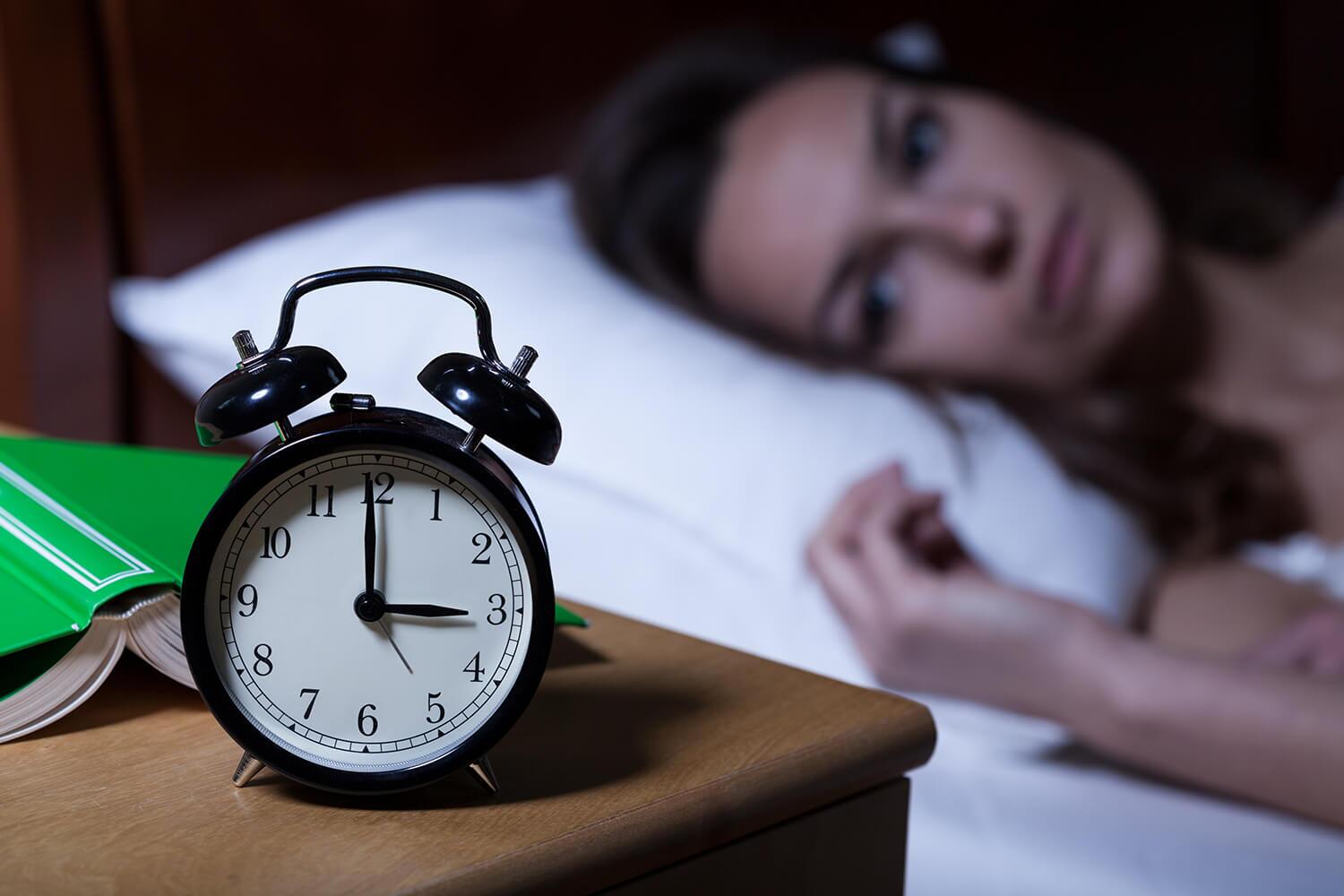Written by Ashley Kane,
Brightside Health
9 Minute Read

Medically reviewed by:
Erin O'Callaghan, PHD
Director of Therapy
10 Minute Read

Every now and then you might find yourself tossing and turning, waking up in the middle of the night, or getting up way too early in the morning. While this is normal on occasion, it might be a sign of insomnia if it becomes a regular occurrence.
Insomnia is a common sleep disorder that looks different from person to person. Insomnia can be a symptom of anxiety and depression, or it can develop on its own unrelated to other medical concerns. There are multiple types of insomnia, and understanding them can help you have a better grasp on what you can do about it.
What is Insomnia?
According to the American Academy of Sleep Medicine’s ICSD-3 manual, insomnia is a “persistent difficulty with sleep initiation, duration, consolidation or quality.”
Essentially, it is a sleep disorder that can make it hard to fall or stay asleep. It often results in tiredness upon waking, lower energy levels throughout the day, poor moods, and a decrease in productivity in work or school. Over time, it can even lead to physical health concerns.
This sleep disorder may be associated with another medical concern, or it may even be the primary problem.
Symptoms of insomnia include:
- Difficulty falling asleep
- Waking up throughout the night
- Waking too early in the morning
- Feeling sleepy during the day
- Feeling unsatisfied by sleep
- Irritability throughout the day
- Difficulty focusing
- Increased errors or accidents
Other medical conditions linked with insomnia include depression, anxiety, chronic pain, cancer, diabetes, heart disease, asthma, sleep apnea, gastroesophageal reflux disease (GERD), and thyroid disorder.
Main Types of Insomnia
Insomnia can last for a brief period of time, or it can become ongoing persistently for weeks or months.
Acute Insomnia
Acute, or short-term, insomnia is something that many people are likely to experience at some point in their lives. Short-term insomnia may last for a few days or as long as about three months.
It’s often caused by an external stressor in one’s life, such as a traumatic event, marital or relationship problems, financial and work-related stressors, or drug and alcohol usage. More recently, the COVID-19 pandemic has been the cause of short-term stress and insomnia for many individuals.
The symptoms of acute insomnia may fade on their own as you deal with the stressors that are causing it. This is why it’s so important to make stress management a part of your nightly ritual. With that said, if short-term insomnia persists, it can develop into chronic insomnia.
Chronic Insomnia
Chronic insomnia is characterized by a long-term pattern of difficulty sleeping. Insomnia is considered chronic if it lasts for longer than three months and you exhibit symptoms at least three nights per week.
Many chronic insomnia cases are secondary, meaning there is another condition or side effect that is causing it. Many underlying causes include irregular sleep schedules or poor sleep routines, underlying physical problems, certain medications, and mental health disorders such as depression and anxiety.
Sometimes chronic insomnia is the primary problem, meaning it is not caused by another condition. Chronic insomnia’s cause is not well understood, but persistent stress, negative emotions, jet lag and shift work can all be factors.
Chronic insomnia can also affect how well your heart, brain and other body parts work. Ongoing insomnia can increase the risk of certain health conditions or cause existing conditions to worsen. These conditions include breathing problems, heart problems, and thoughts of suicide. If insomnia is keeping you awake, you could have an increased risk of issues like high blood pressure and obesity.
Other Presentations of Insomnia
If you talk to a provider about your insomnia, it will likely be categorized as chronic or acute anxiety, as listed above. However, beyond its “acute” or “chronic” diagnosis, your insomnia may additionally fall under one of the following subcategories. These subtypes can help you better understand the underlying cause of your insomnia.
Sleep Onset Insomnia
Sleep onset insomnia describes difficulty falling asleep whenever you lay in bed. You may toss, turn, change clothes or blankets, set the room temperature, and more — but you still just can’t fall asleep. Most people with sleep onset insomnia are unable to fall asleep even after a half hour of laying in bed.
Difficulty falling asleep can be attributed to a number of external forces, such as life stressors, loud and noisy environments, poor sleep hygiene, eating a large meal before bed, or even lack of adequate exercise.
Sleep Maintenance Insomnia
This type of insomnia describes the inability to stay asleep throughout the night. It usually means waking up at some time in the middle of the night and being unable to fall back to sleep for at least 20-30 minutes.
The causes of sleep maintenance insomnia are similar to those of sleep onset insomnia, though this may also be caused by bad nightmares.
Early Morning Awakenings
While many experts view this as a component of sleep maintenance rather than a type of insomnia, it refers to awakening in the morning earlier than you plan. Not getting the desired amount of sleep can have some negative effects on your mood and cognition throughout the day.
There is a strong link between depression and chronic early awakening. Other mental health disorders like anxiety or panic disorder can have a negative impact on your sleep as well.
Comorbid Insomnia
This is when insomnia co-exists with another medical or mental health condition. Common coexisting conditions include anxiety, depression, gastrointestinal problems, or physical pains. Insomnia may also have a bi-directional relationship with a number of these same things, as well. This means that these conditions worsen insomnia, and insomnia worsens the symptoms of these conditions in turn.
Most cases of insomnia fall into this category, as there is almost always some kind of underlying condition that is causing your insomnia to occur. This is in contrast to primary insomnia, which is present with no evidence of other medical or psychological conditions.
Insomnia and Mental Health Disorders
Mental health disorders can often be a cause of comorbid insomnia. Nearly half of all insomnia cases exist alongside depression, stress, and anxiety.
As with many instances of comorbid insomnia, there is a bi-directional relationship between insomnia and disorders such as anxiety and depression. Insomnia isn’t only a symptom of mental health disorders. Recent studies have suggested that insomnia can also contribute to the development of mental health disorders.
For example, while anxiety can cause you to have trouble falling asleep, insomnia may put you at a higher risk for developing an anxiety disorder.
Treatments for Insomnia
Sometimes, alleviating your insomnia symptoms is as simple as making a few lifestyle changes. Along with prescription or over-the-counter medication if you have a sleep problem, there are also professional treatment methods that you can undergo for effective relief.
Cognitive Behavioral Therapy for Insomnia (CBT-I)
Cognitive behavioral therapy, or CBT, is an evidence-based therapy that teaches tools that can help patients manage the symptoms of mental disorders like anxiety and depression. However, it’s often recommended as the first line of treatment for people with insomnia, especially when chronic.
Through CBT-I, the goal is to control or eliminate negative thoughts or actions that are affecting your sleep hygiene. Techniques like stimulus control therapy aim to coach you through setting consistent bedtimes or leaving the room if you can’t sleep for 20 minutes. Also, relaxation techniques can be used to help you wind down before bed and ease yourself into a better headspace for sound sleeping.
CBT is an active process for the patient that requires them to apply the tools they learn in regular therapy sessions in their day-to-day lives.
You can speak with a medical provider to see if CBT-I is an effective process for treating your acute or chronic insomnia.
Lifestyle Changes
For infrequent insomnia, you may be able to make a few adjustments to your sleeping schedule. Computers, TVs, video games, smartphones, or other screens just before bed can interfere with your sleep cycle.
A good practice is to reduce your screen time before bed, turning off electronic devices at least 30 minutes before going to bed. Similarly, you can try enhancing your sleeping environment by making sure it’s quiet, dark, and cool.
Additionally, maintaining good sleep habits is crucial. You should try setting a consistent sleep-wake cycle and try to prioritize getting at least seven to nine hours of sleep. Furthermore, avoiding caffeine late in the day is also strongly recommended.
Medication
Benzodiazepine sedatives such as Ambien and Lunesta may be prescribed as sleeping aids to help manage short-term insomnia, but these medications can be habit inducing over time.
In some cases, medical providers will prescribe antidepressants to help manage insomnia in patients with a history of depression, anxiety, or other mood disorders. Antidepressants are comparatively less habit forming than benzodiazepines. When antidepressants are used to manage insomnia, it’s because providers are attempting to manage the underlying cause of that insomnia—anxiety and depression.
Because of the bi-directional relationship between mental health disorders and insomnia, some people experiencing insomnia may find that antidepressants can help manage both conditions.
In Summary
Insomnia is a common sleep disorder that refers to the inability to fall asleep or stay asleep. While everyone may toss and turn every now and then, insomnia is a more persistent issue that can have mental and physical side effects when left unaddressed.
There are two main types of insomnia: acute and chronic. Acute insomnia is usually caused by a major change or life event and often subsides once those stressors have been alleviated. Chronic insomnia lasts for more than three months and is often a secondary condition to a mental or physical condition.
Subtypes of insomnia include sleep onset insomnia, sleep maintenance insomnia, early awakening insomnia, and co-morbid insomnia, the latter of which describes almost all cases.
If you’re having trouble sleeping at night because stress and anxiety is getting the best of you, you’re not alone. Getting the help you need can be challenging, but Brightside is here to help you make your first steps.
After taking a brief free assessment, you’ll be matched with a therapist or psychiatric provider who will craft a treatment plan that’s just right.
Click here to take the first steps towards a good night’s rest.
Sources:
Too Early to Get Up, Too Late to Get Back to Sleep | Harvard Health
Chronic insomnia as a risk factor for developing anxiety and depression | PubMed













